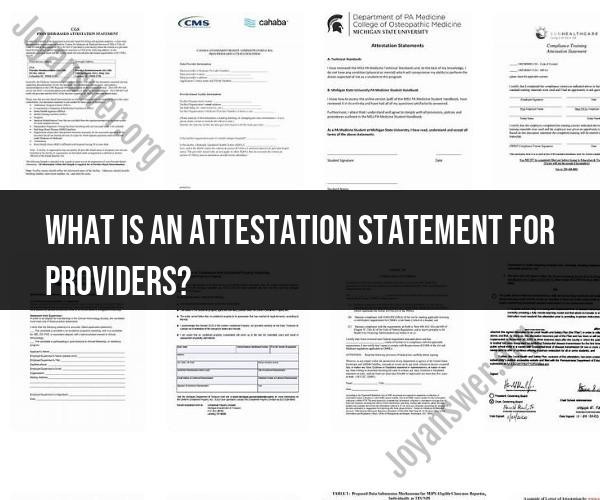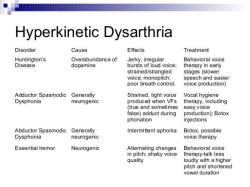What is an attestation statement for providers?
An attestation statement for providers is a formal declaration made by a healthcare provider or organization, typically in the context of healthcare compliance and regulatory requirements. The purpose of an attestation statement is to confirm or verify certain facts, actions, or compliance with specific regulations, standards, or guidelines.
Here are some key details about attestation statements for providers:
Purpose: The primary purpose of an attestation statement for providers is to affirm that certain actions, conditions, or standards have been met or adhered to. It serves as a documented assurance of compliance or adherence to specific requirements.
Regulatory Compliance: In healthcare, attestation statements are often used to demonstrate compliance with various regulations and standards. For example, healthcare providers may use attestation statements to confirm compliance with the Health Insurance Portability and Accountability Act (HIPAA), the Affordable Care Act (ACA), or other regulatory frameworks.
Documentation: Attestation statements are typically documented in writing and may require a signature or electronic validation from the responsible provider or organization. This documentation is important for maintaining transparency, accountability, and a record of compliance.
Content: The content of an attestation statement can vary depending on the specific requirement it addresses. It may include details about the provider or organization, the specific regulation or standard being attested to, the date of compliance, and any additional information necessary to verify adherence.
Auditing and Verification: Attestation statements are often subject to auditing and verification by regulatory bodies or third-party entities. This helps ensure that the claims made in the statement are accurate and that compliance has been maintained over time.
Legal Implications: Making a false attestation statement can have legal consequences. Healthcare providers and organizations must take the accuracy and integrity of their attestation statements seriously, as they may be held accountable for any inaccuracies or non-compliance.
Use Cases: Attestation statements can be used in various healthcare contexts, such as for verifying the security and privacy of patient data, demonstrating compliance with quality standards, confirming adherence to billing and coding regulations, and more.
In summary, an attestation statement for providers is a formal declaration used in healthcare to confirm compliance with specific regulations, standards, or guidelines. It plays a crucial role in ensuring transparency, accountability, and adherence to legal and regulatory requirements within the healthcare industry.
Attestation Statements for Providers: Importance and Purpose
Attestation statements are formal declarations that providers make to attest to the accuracy and completeness of their documentation. They are important because they help to ensure the integrity of the healthcare system and protect patients from harm.
Attestation statements can be used for a variety of purposes, including:
- Verifying provider qualifications and credentials. Payers and other healthcare organizations may require providers to submit attestation statements to verify their qualifications and credentials. This helps to ensure that patients are receiving care from qualified providers.
- Supporting medical necessity for services. Payers may require providers to submit attestation statements to support the medical necessity of certain services. This helps to prevent fraud and abuse.
- Complying with regulatory requirements. Some regulatory requirements, such as those related to Medicare and Medicaid, require providers to submit attestation statements.
Provider Documentation: The Significance of Attestation Statements
Provider documentation is essential for ensuring the quality and safety of patient care. Attestation statements play an important role in provider documentation by helping to ensure that it is accurate, complete, and compliant with regulatory requirements.
When providers attest to the accuracy and completeness of their documentation, they are taking responsibility for their work and demonstrating their commitment to providing quality care. Attestation statements also help to protect providers from liability in the event of a medical malpractice claim.
Ensuring Accuracy: How Attestation Statements Benefit Providers
Attestation statements can help providers to ensure the accuracy of their documentation in a number of ways. For example, attestation statements can:
- Help providers to identify and correct errors. When providers attest to the accuracy of their documentation, they are forced to review it carefully. This can help to identify and correct errors before they are submitted to payers or other healthcare organizations.
- Encourage providers to follow best practices. Attestation statements can encourage providers to follow best practices for documentation, such as using standardized templates and including all of the required information. This can help to ensure that documentation is accurate and complete.
- Reduce the risk of audits. Providers who regularly attest to the accuracy of their documentation are less likely to be audited by payers or other healthcare organizations. This can save providers time and resources.
Overall, attestation statements are an important tool for providers to ensure the accuracy and completeness of their documentation. They can also help providers to comply with regulatory requirements and protect themselves from liability.
Additional Benefits of Attestation Statements for Providers
In addition to the benefits listed above, attestation statements can also help providers to:
- Improve patient care. By ensuring that documentation is accurate and complete, attestation statements can help providers to identify and address patient needs more effectively.
- Reduce costs. Accurate documentation can help providers to avoid costly errors, such as billing for services that were not provided or failing to bill for services that were provided.
- Increase efficiency. Attestation statements can help providers to streamline their documentation processes and improve efficiency.
Overall, attestation statements are a valuable tool for providers to improve the quality and safety of patient care, reduce costs, and increase efficiency.












